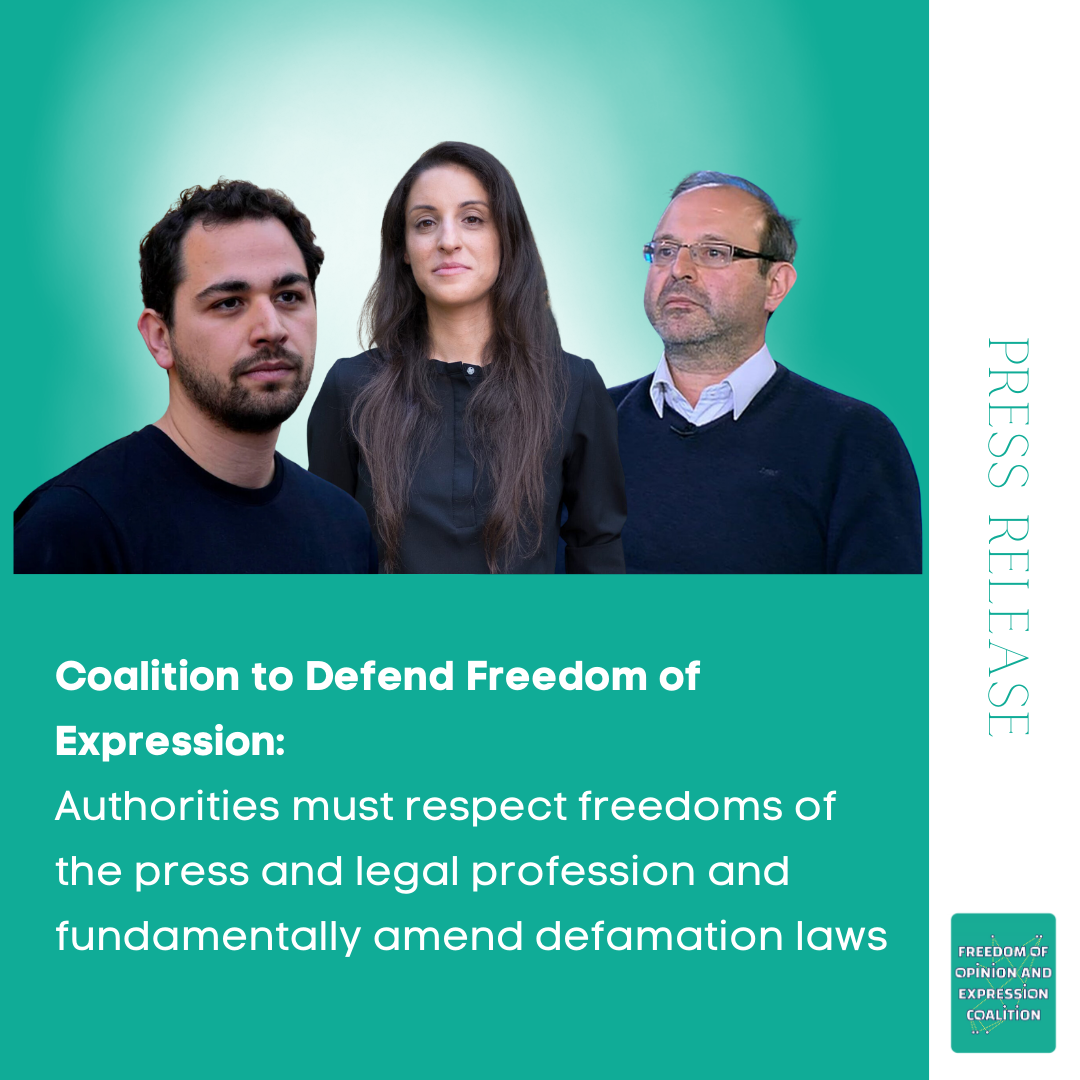Travel Bans in Egypt: Violating the Law and the Constitution

On 6 October 2018, it was reported that Egyptian lawyer Khaled Ali had been added to the lists of people banned from travelling outside the country. The decision to add him to the list was made by the investigating judge in Case no. 173 of 2011 (known in the media as the “civil society organizations case”).[1] Ali was not the first to be banned from travel based on this case. He was preceded by many of the founders, directors, and workers of civil society organizations concerned with human rights, some of whom have been banned for almost four years.[2] The investigation into this case began in 2011 but was halted for a period, only to be revived in early 2016.[3] The investigating authorities seem to be using the case as a pretext for issuing travel bans and other preventative decisions.[4] Because of the length of the investigation and the fact that the investigating judge exceeded the timeframe that the Code of Criminal Procedure grants him to complete investigations, a number of the accused filed a case to nullify the decision to renew the judge’s assignment more than twice in a row and for a period longer than one year. That case is still pending.[5]
Besides the fact that the accused in this case are being prosecuted because of their activity defending human rights and freedoms, the investigation has witnessed many legal and constitutional violations. This article focuses on the aforementioned travel bans and preventative decisions. These decisions are being issued for an indefinite period in contravention of Article 62 of the Constitution,[6] and without the subjects being informed of them or the reasons for them in contravention of Article 54.[7] Additionally, the decisions are being issued without the subjects being summoned and interviewed, nor are the subjects afforded an opportunity to defend their right to freedom and respond to the reasons given either before or after the decisions are issued, in contravention of the aforementioned article and Article 98.[8] This we will detail below.
Travel Ban as Precautionary Measure Subject to Controls
A person may only be banned from traveling outside the country by an explained judicial order valid for a limited period of time, as stated in Article 62 of the Constitution. Despite the clarity of the constitutional text in this regard, all the travel bans the investigating judge has issued in this case are for an indefinite period.
On multiple occasions, the Court of Cassation, the Chamber of Uniform Principles in the Supreme Administrative Court, and the Supreme Constitutional Court have agreed that there is no clear text in the Code of Criminal Procedure, or any other law, granting investigators the right to issue travel bans[9] and that there is a legislative gap in this regard. They also agreed on the investigating authority’s right to issue such a decision for the sake of properly administering the investigation or on deriving the right directly from the Constitution. Furthermore, they agreed that the subject of the travel ban has the right to challenge it. On the other hand, they disagreed on whether the decision is a judicial or administrative one and, subsequently, on which court is competent to examine the challenge. The Court of Cassation concluded, in the aforementioned ruling, that the ban is a judicial decision challengeable before the Criminal Court. Because the Code of Criminal Procedure does not explain how the matter can be presented to the Criminal Court, the Court of Cassation reasoned that the case should be filed to the Criminal Court in accordance with the rules stipulated in the Code of Civil and Commercial Procedure. The Chamber of Uniform Principles in the State Council, on the other hand, deemed the ban an administrative decision challengeable before the Court of Administrative Justice. As for the Constitutional Court, it concluded that the ban is a judicial decision challengeable before the regular judiciary if it is issued in the context of a criminal investigation.
The various judicial bodies have tried to fill this legislative gap by finding a basis for issuing travel bans via jurisprudence and have implored the legislature to issue a law establishing the controls on them, as the 1971 Constitution charged it with doing. Nevertheless, the legislature has not yet done so.[10] Nobody knows the motivation behind the insistence of the government and legislative branch on maintaining the status quo, but the gap is clearly being abused.
The investigating authorities are exploiting this legislative gap to avoid delimiting the period of travel bans. However, because of this gap, these authorities have no legal text upon which to base their right to issue such decisions to begin with. If they were relying directly on the constitutional text to issue these decisions, as the Court of Cassation states,[11] then they would have to adopt the text in its entirety and issue time-limited bans accordingly, rather than selectively applying the part that suits them. If they were relying on analogy with their power to issue decisions restricting freedom such as those ordering preventative detention and its alternatives, and on the notion that whoever has the power to fully restrict freedom may also partially restrict it, then because analogy must always favor the accused, they should have applied all the controls governing preventative detention and its alternatives to travel bans. These controls include specifying the bans’ time period, the means of extending them, their upper limit, and the means of challenge. The investigating authorities must not use analogy in restricting freedom without adhering to its controls.
The investigating authorities’ practices indicate that they do not consider travel bans to be among the measures stipulated in Article 201 of the Code of Criminal Procedure. That is because those measures require applying the articles pertaining to preventative detention and these authorities have not done so. If travel bans were considered one of those measures, they would have to be issued for just 15 days no more than three times in succession. If the investigating judge wanted to extend them for more than 45 days, he would have to seek an order from the competent court and adhere to the other conditions that apply to preventative detention.[12]
From another angle, under the Code of Criminal Procedure, all the investigating authority’s decisions that restrict the accused’s freedoms are temporary and have a maximum period of effect or implementation. For example, arrest – even on the basis of an investigating judge’s order – has a time limit of 24 hours, and arrestees must be presented to the authorities for them to decide whether to imprison or release them.[13] Wiretapping and surveillance decisions are also time-limited.[14] So why is the investigating judge issuing open-ended travel bans? We cannot accept that the investigating judge has a right to issue travel bans with no upper limit or investigate a case endlessly, as is occurring in this instance. Otherwise, the judge could deprive citizens of their constitutional freedoms for decades without a judicial ruling, which would violate the Constitution and defy justice.
The Subject’s Right to be Informed of the Reasons for Their Travel Ban
Article 54 of the Egyptian Constitution stipulates that “Nobody may be arrested, searched, imprisoned, or have his freedom restricted by any restriction except via an explained judicial order necessitated by an investigation. Anyone whose freedom is restricted must be immediately informed of the reasons … and be brought before the investigating authority within 24 hours of the time his freedom is restricted”. This text is clear in its reference to “any restriction” on freedom after mentioning arrest and imprisonment, and there is no disputing that the rights to move about and travel are guaranteed by the Constitution. Hence, the issuance of travel bans is a form of restriction of freedom, just as all Egypt’s supreme courts determined in the aforementioned rulings. Subsequently, subjects of travel bans must be informed of the restriction placed on their freedom, the reasons for it, and the investigation into them within 24 hours. Additionally, Article 83 of the Code of Criminal Procedure stipulates that, “If the investigating judge’s orders are not issued in the presence of the parties, they shall be conveyed to the Public Prosecution, which must inform the parties of them within 24 hours of the date of their issuance”. However, as we indicated in the introduction, most of those banned from travel in this case learned of the bans while finalizing their travel arrangements, and none of them were advised of the decision’s issuance or able to discover the reasons for it.[15]
Travel Bans and the Right of Defense
Article 98 of the Constitution guarantees the right of defense.[16] The right takes effect and must be made available as soon as freedom or any other constitutional right is compromised. Any restriction of personal freedom without the subject being enabled to defend it is a violation of this constitutionally guaranteed right, which requires that the reasons for restricting freedom be conveyed and an opportunity be given to respond to them.
This guarantee has been entirely disregarded with respect to some of the accused in this case.[17] For example, Hossam Bahgat, the founder and former executive director of the Egyptian Initiative for Personal Rights, was banned from travel in February 2016, and he has not yet been questioned. Another example is Gamal Eid, the executive director of the Arabic Network for Human Rights Information, who has been banned from travel for approximately three years, with others accused also being banned for extensive periods of time.
Note that to reach their conclusion, the investigating authorities rely only on the narrative of police and National Security Agency personnel and witnesses, and evidence corroborating the crime. They do not listen to the other side, allow it to present exculpatory evidence, or listen to defense witnesses. This reflects a flaw in the investigation process, which should be fair and afford all parties the same ability to prove or disprove a given action.
Conclusion
Ultimately, nobody denies the investigating judge’s power to issue travel bans. An authority that has the power to ban the accused from leaving their home has the power to ban them from leaving their country or to investigate the case in the manner it sees fit to uncover the truth. However, just as the state demands that its citizens abide by the law, it – and all its authorities – must abide by the law and its constitution, and provide all the rights and guarantees contained therein to every person without discrimination. From another angle, the legislatures ongoing failure to regulate travel bans must not be exploited to undermine the fundamental rights of citizens or accused persons, or as a justification for the other authorities to deviate from the Constitution’s provisions.
This article is an edited translation from Arabic.
Keywords: Travel Ban, Egypt, Personal Rights, Human Rights, Freedom of Movement, Khaled Ali
[1] See the Egyptian Initiative for Personal Rights, “Khalfiyya ‘Amma ‘an al-Qadiyya Raqm 173 al-Ma’rufa bi-Qadiyyat al-Tamwil al-Ajnabiyy: Khatar Washik min al-Mulahaqa wa-l-Ighlaq”, 21 March 2016.
[2] See “Ihya’ al-Qadiyya 173 bi-Sha’n al-Tamwil al-Ajnabiyy Irhab li-l-Mujtama’ al-Madaniyy”, Human Rights Monitor.
[3] Ibid.
[4] Karim Subhi, “al-Jinayat Tu’ayyidu Qarar Man’ Jamal ‘Id wa-Husam Bahjat wa-3 Akharin min al-Tasarruf fi Amwalihim”, Youm7, 17 September 2016.
[5] Mohamed Adel Soliman, “Huquqiyyun Misriyyun Yat’anuna ‘ala Ijra’at al-Tahqiq ma’ahum fi Qadiyyat al-Tamwil al-Ajnabiyy”, The Legal Agenda, 31 August 2017.
[6] Article 62 of the Constitution states, “Freedom of movement, residence, and migration are guaranteed. No citizen may be expelled from the state’s territory, nor prevented from returning to it. No citizen may be prevented from leaving the state’s territory or forced to reside in it, nor banned from residing in any specific area, except via an explained judicial order for a set period, and in the circumstances outlined in the law”.
[7] Article 54 of the Constitution states,
Personal freedom is a natural right, is protected, and may not be infringed upon. Except in cases of flagrante delicto, nobody may be arrested, searched, imprisoned, or have his freedom restricted by any restriction except via an explained judicial order necessitated by an investigation. Anyone whose freedom is restricted must be immediately informed of the reasons and informed of his rights in writing, enabled to contact his relatives and his lawyer immediately, and be brought before the investigating authority within 24 hours of the time his freedom is restricted.
[8] “The right of defense in person or by proxy is guaranteed”.
[9] See Court of Cassation ruling on Challenge no. 48117 of judicial year 74, issued 14 June 2010; the ruling of the Chamber of Uniform Principles in the Supreme Administrative Court on Challenge no. 12215 of judicial year 57, issued on 6 April 2013; and Supreme Constitutional Court ruling on Challenge no. 40 of judicial year 27 (disputes chamber), issued on 13 June 2015.
[10] At the beginning of this year, Parliament debated a bill to amend the Code of Criminal Procedure. The bill placed some controls on travel bans, but the law has not yet been issued (“Tanzim al-Man’ min al-Safar fi Muqtarah Ta’dil Qanun al-Ijra’at al-Jina’iyya: Hal Yada’u Hadd li-l-Ta’assuf fi Istikhdamihi?”).
[11] Challenge no. 48117 of judicial year 74, issued on 14 June 2010.
[12] Rules regulating preventative imprisonment stipulated in Article 142 and Article 143 of the Code of Criminal Procedure.
[13] Paragraph 2 of Article 131 of the Code of Criminal Procedure.
[14] Paragraph 2 of Article 95 of the Code of Criminal Procedure.
[15] Examples are Hossam Bahgat, the founder and former executive director of the Egyptian Initiative for Personal Rights; Gamal Eid, the director of the Arabic Network for Human Rights Information; and Mozn Hassan, director of Nazra for Feminist Studies.
[16] Article 98 stipulates that, “The right of defense in person or by proxy is guaranteed”.
[17] “Man’ al-Sahafiyy Husam Bahjat min al-Safar”, Mada, 23 February 2016.



